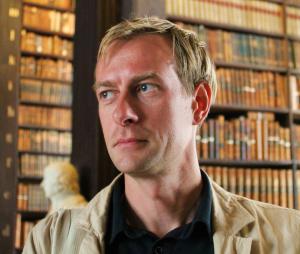U of Oregon's Colin Koopman Kicks Off Colloquium Series
The Department of Communication's colloquium series commenced for Fall 2015 with Dr. Colin Koopman, associate professor of philosophy at the University of Oregon.
 The talk, titled "Informational Politics for Informational Persons," was presented
Thursday, Sept. 10 in the LNCO Reading Room (2120). Koopman asserted that a number
of contemporary political assemblages, from mass surveillance to finance capitalism
and big data, suggest that the world may be in the midst of new political conditions.
Many have sought to conceptualize those assemblages in such terms as "the information society or
"new media culture," while others would categorize them as an ideological effect of
neoliberalism. Koopman argued for a different conceptualization of the stakes of contemporary
political transformations by attending to potentially new modes of power that he believes
are "redefining the very terms of the politics of the now." He concurs with other
new media theorists such as Wendy Chun, Alex Galloway, and Tiziana Terranova, who
have made productive use of the political philosophy of Michel Foucault to rethink
the conditions of new media.
The talk, titled "Informational Politics for Informational Persons," was presented
Thursday, Sept. 10 in the LNCO Reading Room (2120). Koopman asserted that a number
of contemporary political assemblages, from mass surveillance to finance capitalism
and big data, suggest that the world may be in the midst of new political conditions.
Many have sought to conceptualize those assemblages in such terms as "the information society or
"new media culture," while others would categorize them as an ideological effect of
neoliberalism. Koopman argued for a different conceptualization of the stakes of contemporary
political transformations by attending to potentially new modes of power that he believes
are "redefining the very terms of the politics of the now." He concurs with other
new media theorists such as Wendy Chun, Alex Galloway, and Tiziana Terranova, who
have made productive use of the political philosophy of Michel Foucault to rethink
the conditions of new media.
Koopman posited that the emerging political landscapes can't be comprehended under previous conceptualizations of power (the sovereign power of the state, the disciplinary power of training, the biopower of regulation), but rather by an emerging notion of "infopower" that intersects information and power. He focused in particular on how societies have come to recognize themselves in the flurry of information and data that is constantly being produced about and by them -- including social media profiles, dossiers and transcripts, and identificatory paperwork. Utilizing Foucaultian methodology, Dr. Koopman investigated the history of how people have become as information-focused as society is today. Specifically, his focus was on an array of practices from the 1910s-1930s that precipitated the emergence of the total informational vision of cybernetics.
Find out more about Dr. Koopman and his research here.
